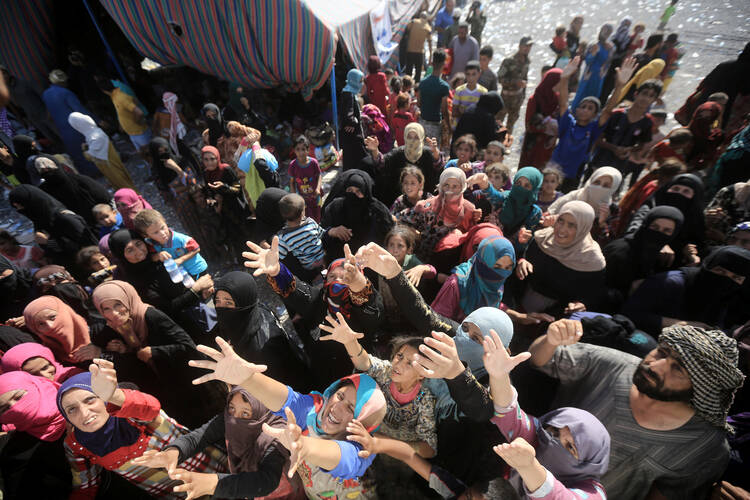Most Western humanitarian aid is failing to reach the thousands of Christians who have fled their homes as Islamic State fighters have swept through Iraq and Syria, three Middle Eastern bishops said at the 134th Knights of Columbus convention in Toronto.
"It's time for election [in the United States] and also it is time to rethink American policy in the Middle East," said Chaldean Archbishop Bashar Warda of Irbil, in Kurdish-controlled northern Iraq. "Call on the government to direct the help directly to the people affected."
Aid sent to refugee camps in the region never reaches the Christian minorities who do not feel safe inside the camps. The only aid reaching Christians in the region comes from churches, he said. Western governments need to get over their reluctance to directly fund church organizations, he added.
A visibly angry Melkite Archbishop Jean-Clement Jeanbart of Aleppo told journalists: "The governments send their money to the people in the camps and to the fighters and nothing to us."
Archbishop Jeanbart argued that aid is needed as a way of keeping Christians in the region ready to reclaim their homes when the war involving thousands of foreign mercenaries in Syria is over.
"Syria is a holy land because millions of Christians have shed their blood in this land—fathers of the church who preferred to die than leave their faith," he said.
The destruction of ancient Christian communities in Syria and Iraq is a loss to the world and a fundamental change in a once pluralistic and multi-ethnic society in Syria, said Archbishop Jeanbart.
"It is our country. We were there before the Muslims and the Muslims know it," he said. "It is very important to keep this relic of holy history. ... We are sons of Abraham effectively, not theoretically."
Patriarch Ignace Joseph III Younan, head of the Syriac Catholic Church, dismissed Western policy regarding the Syrian civil war as Machiavellian and hypocritical, driven by global strategic interests and the price of oil.
"We and other minorities have been abandoned, and also we can say we have been betrayed," said Patriarch Younan. "We don't have a nation who will defend us. We don't have this oil to bribe anyone."
Americans have a moral responsibility to protect the minorities they left vulnerable after the 2003 invasion by a U.S.-led coalition to topple President Saddam Hussein, said Patriarch Younan, who served for 14 years as bishop of the New Jersey-based Diocese of Our Lady of Deliverance for Syriac Catholics in the United States and Canada.
"The superpowers are so hypocritical," he said. "You can't export democracy to countries where you don't have the basics of democracy. ... Chaos is the biggest enemy of minorities in the Middle East. ... We want a democratic, lay system of government. But they [Syrian and Iraqi Sunni Muslims] don't."
The patriarch's comments echoed some of his earlier comments to the Knights, when he spoke of the opportunism of Western governments.
"Economic opportunism seems to be the best way to keep the oil flowing and provide the best trade deal. It is time to stop pandering to those rulers and governments and to start looking for the real good of the peoples of the region," he told them.
He also criticized "allied rich countries" such as Saudi Arabia that he said channel funding and weapons to terrorists.








